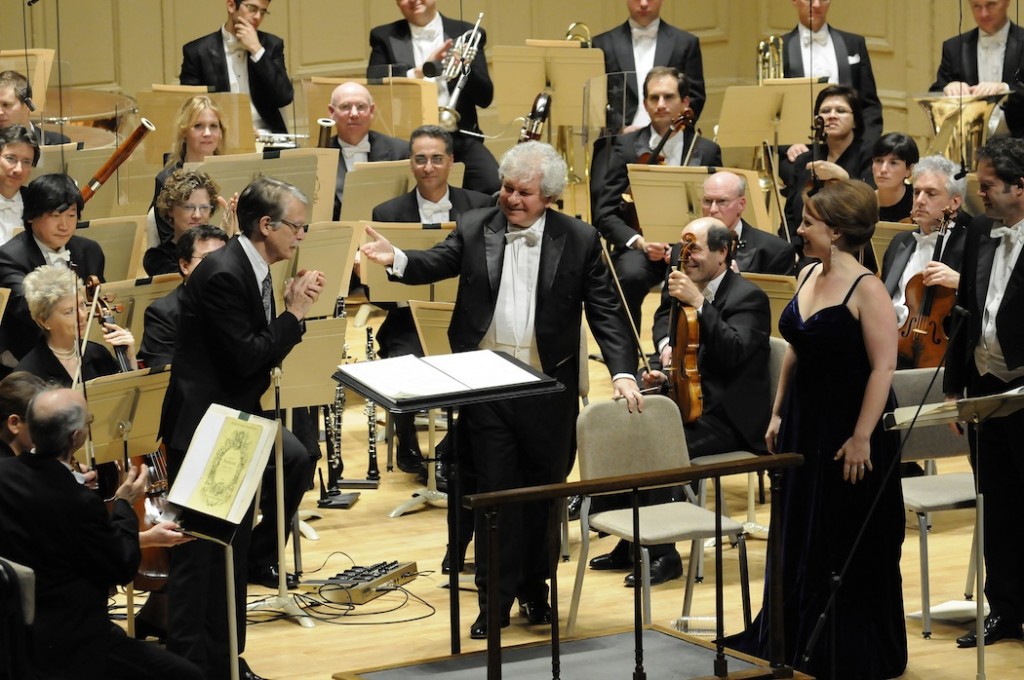BSO, Bělohlávek offer arresting Harbison, mixed Beethoven

Conductor Jiri Bělohlávek acknowledges composer John Harbison following the performance of his Symphony No. 5, with soloists Sasha Cooke and Gerald Finley. Photo: Stu Rosner
How do you know when a modern composer is truly fearless? When he writes a piece titled “symphony” and bases it on the myth of Orpheus.
These two concepts come down to us so laden with centuries’ worth of masterpieces that one could be forgiven for thinking there’s nothing left to say about them. Yet here is John Harbison, circa 2008, setting poems about Orpheus in a symphony — No. 5, no less — and, as abundantly demonstrated Thursday night at Symphony Hall by the Boston Symphony Orchestra under Jiri Bělohlávek, creating an arresting meditation on grief and the hereafter.
The Cambridge-based composer originally conceived this piece for orchestra alone, but the BSO’s then-music director James Levine suggested adding voices — an inspired idea, it turned out, because the poems’ many layers of image and meaning spurred Harbison to produce vivid and novel orchestral textures, from lush to acidic and from brawny to the thinnest thread of sound.
In particular, Orpheus and Eurydice by Czeslaw Milosz, the text for the first two movements (set here in English translation), mixes anachronistic modern urban imagery with the pastoral myth of the singer who goes to Hades to lead his love back to the land of the living. It creates still more ironic distance by being a narrative about Orpheus, not told in his own voice. Harbison casts an electric guitar as Orpheus’s lyre, and moves smartly through the long Milosz poem, rarely lingering on a line, and yet fitting every infernal image with its own uncanny musical sound. Gerald Finley’s clear, slightly reedy baritone and lucid diction were just right for the role of an intense, sometimes humorous narrator.
The third movement, based on Relic by Louise Glück, finds Eurydice looking back at the same events, also with an air of detachment (death will do that to you). Both the melancholy poem and the burnished voice of mezzo-soprano Sasha Cooke would have benefited from a bit more Straussian tenderness than Harbison put in this cool setting.
The vocal timbres of Cooke and Finley didn’t blend well in the closing movement, where they sing together most of the time in canon, but perhaps this mismatch suited the dissociative character of the work as a whole. An image from the text — one of Rainer Maria Rilke’s Sonnets to Orpheus — lingers in the mind and the music: the vibrations from “the crystal cup that shattered even as it rang” inspire the piercing, extremely high chords that close the work.
After the intermission, the orchestra offered two Beethoven works, the Fourth Piano Concerto, with Jonathan Biss as soloist, and Leonore Overture No. 3.
From the concerto’s opening bars (for the piano alone, then the orchestra responding), pianist and conductor seemed to be on different wavelengths, one dreamy, the other all business. Biss’s highly inflected playing grew tiresome at times — all those rubber-band rubatos — but it did make for a volatile, fantastic rendition of the movement’s long solo cadenza.
This performance’s split vision continued in the second movement, whose an Orpheus-in-Hades contrast between brusque strings and a pleading piano was heightened to the point of exaggeration. Soloist and conductor finally got together in the finale, but the crisp main theme could have used a jolt of Dvořák-style dance inflection from the Czech maestro; instead, however hard the players worked to lift the music, the lax rhythms kept it earthbound.
It’s a familiar joke that Beethoven’s Leonore Overture No. 3 so amply summarizes the opera Fidelio’s plot as to make what follows redundant. So, why not end, instead of begin, an orchestral program with it? This clever idea unfortunately foundered on Bělohlávek’s performance, which sounded like a read-through, with little suspense in the slow introduction or real drama in the allegro.
The program will be repeated 1:30 p.m. Friday and 8 p.m. Saturday. bso.org; 617-266-1200.
Posted in Performances



